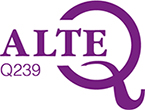| Level A2 (Beginner)
Speech Intentions / Speech Acts
Establishing and maintaining communication: greetings and farewell, introduction, thanking, seeking attention
- Giving and receiving personal information: identifying, describing, locating and asking about persons, places and things
- Personal attitudes (like/love, likes/dislikes/praise) and simple comparisons
- Request, suggestion/proposal, invitation, permission, acceptance and rejection
- Speaking about events: giving and receiving information about habitual events and actions (present); giving and receiving information about past events and actions using short, memorised phrases (past); giving and receiving information about future events and actions (in the case of German and English)
- Apologising
- Giving and receiving specific information about dates, times, quantities, numbers, prices and weather.
Topics
The chart named ECL Topics (see ECL Topics) contains the content expected to be used at A2-level on the ECL language exam.
Language Competencies (English Language)
GRAMMAR
Syntax
- positive statements and negative statements
- open-ended and yes/no questions
- polite requests
- verbs and prepositions
- use of adjectives
- use of adverbs of time, place, frequency, manner
- use of modal verbs
- co-ordinate sentences
- use of direct and indirect objects
- use of infinitive
- use of basic conjunctions (and, but, however, because)
- use of numerals
- use of relative and possessive pronouns
- the word order of simple sentences
- negation
Morphology
- verb tenses: present – simple and continuous
- past – simple
- future – simple, going to
- to BE
- DO as verb and modal
- pronouns
- definite and indefinite articles
- basic prepositions (movement, place, agent)
- possessive adjectives
- quantifiers: many, much, some, any
- numbers
SPELLING: traditional use of written language belonging to the level
VOCABULARY (Lexis) : appropriately used basic vocabulary related to everyday situations and speech acts/speech intentions, general language use containing well-practiced idiomatic expressions and standing locutions, too.
LISTENING COMPREHENSION AND PRONUNCIATION: the production and comprehension of standard language spoken at a pace appropriate for the level.
|
| Level B1 (Elementary)
Speech Intentions / Speech Acts
(in addition to what was described for Level A2)
- Expressing and responding to feelings such as surprise, happiness, sadness, interest and indifference.
- Giving instructions.
- Expressing necessity, obligation and possibility.
- Making proposals, suggestions and invitations.
- Expressing belief, opinion, agreement and disagreement.
- Expressing intention and offering justification.
- Discussing people, events and experiences from the past, and recounting short stories.
Topics
The chart named ECL Topics (see ECL Topics) contains the contenet expected to be used at the level B1 on the ECL language exam.
Language Competencies (English Language)
GRAMMAR
- Syntax
- imperatives, positive and negative
- statements with infinitive and gerund
- compound and complex sentences
- question tags
- clauses of time, manner, place, purpose
- exclamations
- use of linking devices
Morphology
conditional
continuous tenses
past perfect
- modals: can, must, may, might
- passives
- possessive pronouns (statements and interrogatives)
- comparative and superlative
- prepositions
- conjunctions
- SPELLING: traditional use of written language belonging to the level.
- VOCABULARY (Lexis): appropriately used basic vocabulary related to everyday situations and speech acts/speech intentions, general language use containing well-practiced idiomatic expressions and standing locutions.
- LISTENING COMPREHENSION AND PRONUNCIATION: the production and comprehension of standard language spoken at a pace appropriate for the level.
|
| Level B2 (Intermediate)
Speech Intentions / Speech Acts
(in addition to what was described for Level A2 and B1)
- Expressing and responding to feelings (such as astonishment, concentration, confusion, preoccupation, resignation, concern, desire, expectation and disappointment).
- Receiving and giving advice and complex instructions (reacting to them appropriately).
- Complaining, arguing, praising and paying compliments.
- Summarising details, contradicting, evaluating, clarifying, exemplifying, drawing conclusions, affirming and modifying information and opinions.
- Transmitting complex information to a third person (in direct and indirect speech).
Topics
The chart named ECL Topics (see ECL Topics) contains the content expected to be used at level B2 on the ECL language exam.
Language Competencies (English Language)
GRAMMAR
Syntax
- complete sentences, including clauses of comparison, concession, purpose, condition
- reporting of speech
- nominalisation
- expression of complex ideas and hypotheses
- reinforcement of syntax learned at Levels A2 and B1
- adjectival and adverbial phrases
Morphology
- all tenses, including past conditionals
- all passive forms
- modals of obligation, need, possibility, intention, etc.
- suffixes, prefixes, including adjective and adverb formation, and their meaning
- review of morphology acquired at Levels A2 and B1
SPELLING: traditional use of written language belonging to the level.
VOCABULARY (Lexis): appropriately used, well-chosen and wide active vocabulary needed in general and educational/vocational situations and general language use containing idiomatic expressions and standing locutions, too.
LISTENING COMPREHENSION AND PRONUNCIATION: the production and comprehension of standard language spoken at a pace appropriate for the level. |
|
Level C1 (Advanced)
Speech intentions / speech acts
(in addition to what was described for Level A2, B1a and B2)
Exchanging and evaluating information.
- Persuading, negotiating and getting things done.
- Expressing opinions, identifying and recognizing opinions, disagreement.
- Formulating and responding to value judgements.
- Discussing certainty, necessity and obligations.
- Effectively employing compensatory strategies.
Topics
The chart named ECL Topics (see ECL Topics) contains the contexts expected to be used at level C1 on the ECL language exam.
Language Competencies (English Language)
GRAMMAR
Syntax
- review of all work at previous levels
- comprehension of structure of texts (written and spoken)
- coherent and cohesive structure of spoken and written discourse
Morphology
- review of all work at previous levels
- mastery of morphological features used in written and spoken expression
SPELLING: traditional use of written language belonging to the level.
VOCABULARY (Lexis) : appropriately used and sophisticated wide-ranging active vocabulary needed in various communicative situations and speech acts. Safe use of the target language containing collocations and phrases (idiomatic expressions). The appropriate lexical use of cultural realia.
LISTENING COMPREHENSION AND PRONUNCIATION: the comprehension of language that might deviate from the standard spoken language at a pace appropriate for the level. The production of fluent and natural speech. |






